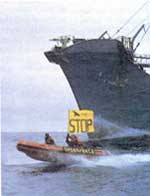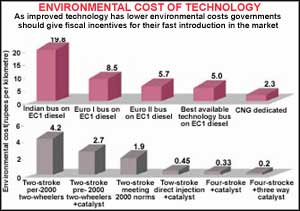
Hour of the green crusader
A third party candidate a renowned green lobbyist has the US ballot watchers in a tizzy over possible outcomes of this year's presidential polls

A third party candidate a renowned green lobbyist has the US ballot watchers in a tizzy over possible outcomes of this year's presidential polls

What, really, is the destination of the Indian Railways (IR)? Is it capable of meeting the growing demands? What is the reason behind the pathological dependence on import of high-cost technology? Is electrification the answer? G K KHARE, chairperson, Rai

Despite stringent criticism directed at its safety standards, DDT still rules as the major pesticide used by India's health sector
Ambassador BO KJELLEN has seen it all, from diplomacy and development to even sports. A "family man", as he describes himself, addicted to music and badminton, the 62 year old Swede began his career with the foreign ministry and has thereafter re

The issue of toilet space for 8.1 million slumdwellers in India's 4 major metros threatens to expand into a matter of social rights

Development strategies cry out for a "bottoms up" approach that involves the intended beneficiaries

A study explains why peaceful pachyderms go on rampages that leave crops and humans devastated

The Indian Railways has raised a stink by opting for an outdated Canadian software programme for controlling its freight operations
DEVELOPING countries have accepted the inarguable importance of the link between population and economic and social development and natural resources, says NAFIS SADIK, secretary general of the International Conference on Population and Development, 1994,
A dearth of information brought brickbats to the department of wastelands development, which was entrusted the Herculean task of reducing the pressure on the forests

When it started, it was considered a part of the lunatic fringe. Greenpeace is today perhaps the most influential of green movements

The Globe is getting warmer. But the only contribution of US businesses is an advertising blitz and political arm twisting to discredit climate science

The state of our nation

Officials claim the locust problem is under control, but unless millions of hoppers young locusts stalking the deserts are exterminated quickly, things could really get out of control
MNES anticipates that its financing in the last two years of the Eighth Plan will be augmented by about Rs 1,300 crore, with the additional funding coming mainly as external assistance from the World Bank and GEF.
ISLAMABAD (February 16 2008): The government is confronting a tough time in attracting private sector's investment in water and power projects as the government has lined more than 40 development projects for Public Private Partnership (PPP). As an informal cut of around 70 billion on 2007-08 PSDP allocation has been placed, the government has speeded up the process of putting the development projects for investment from private sector both in and outside the country, sources told Business Recorder. The investors are not coming forward according to the expectations of the government in hydro-electric and water projects, especially the planned big reservoirs as the government is yet to remove certain reservations about these important projects, the sources said. The planned Basha, Munda and some other projects have been lined for PPP mode of execution. However, there are certain reservations of the private sector's investors on these projects. The government will have to give a resettlement action plan of these projects before taking these projects up with private investors, according to the sources. The sources, however, said that there was overwhelming response from private sector to fully or partially fund projects in other sectors especially the communication, water supply, sanitation, sewerage and solid waste management. Pakistan needs at least 10 percent GDP allocation for development budget, around 20 billion US dollars for one year. This is a huge amount that is actually more than the annual tax collection, which the Federal Board of Revenue (FBR) has made in the past. For the year 2007-08, the tax collection target is little over Rs one trillion and there are indications that FBR would not be able to meet the target, the sources said. In this scenario the PPP mode for taking development agenda forward is must, the sources said. The government has established an independent cell in the planning and development (P&D) division to refer almost every development projects to Infrastructure Project Development Facility (IPDF), an autonomous body to look for investors in launching development projects. The Planning Commission, according to the sources, is required to do a lot to make the projects implementation mechanism neat and clean. This will be a pre-requisite for attracting local and foreign investors in investing in the development schemes. There is a need that the government should do it swiftly in order to maintain the overall growth, Pakistan has achieved in the recent years. A recent World Bank report says that Pakistan is suffering from dearth of infrastructure in water, irrigation, power and transport sector. The report enlists corruption as one of the main reasons that hinders the development drive in Pakistan. Delays in projects' implementation, lack of skilled workforce and implementation of some development schemes on political basis are other factors for unreasonably slowing the development process. Copyright Business Recorder, 2008
US Senate s energy bill

The Goan government echoes environmental concerns in its state budget

future lies in green tax Even after dismantling of direct subsidy on diesel in 1997, Ram Naik, the petroleum minister, admitted that indirect subsidy on diesel had risen to Rs 3 per litre.
US drug companies are responding to criticism of the high cost of prescription medicines by putting out a new message for consumers: "We are not out to fleece you. We are, in fact, toiling hard to